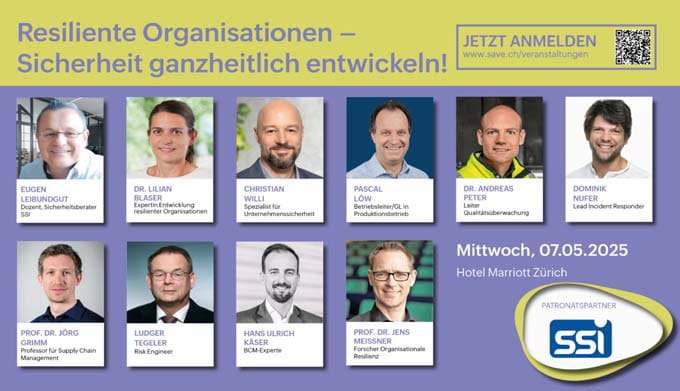Energy and environmental management pay off
Switzerland is facing groundbreaking energy decisions. However, it is not just a question of Switzerland's energy strategy; global aspects must also be taken into account to ensure long-term and environmentally friendly security of supply. How can the economy, politics and science contribute to a more sustainable use of resources? Three speakers at this year's Europe Forum Lucerne 2015 will show ways forward in energy and environmental management.

Kurt Lüscher, CEO of Energie 360°, sees advantages specifically in forward-looking technologies: "There will be technologies that make it possible to transport more and more renewable gas via the natural gas grids that already exist today. These "Power to Gas" (P2G) technologies can also be used to store and transport surplus electricity. They thus also contribute to the foreseeable convergence of the energy networks. "The Internet also offers great development potential, says Kurt Lüscher: "The digitalisation of the energy sector will not only affect the processes and products we already know today, but also completely new areas. These can be subsumed under the term Smart Energy Services: Smart Home, Smart Mobility Smart City, etc."
More ecology in construction drying
One example in the construction sector shows new forms of the energy future: mobile wood pellet building drying. Since 2014, Energie 360º has been working with partners to offer this ecological and efficient alternative to conventional construction drying with heating oil. Because the schedules for the realization of larger construction projects are becoming increasingly tight. Even the smallest delays mean that construction drying has to be accelerated by the use of hot-air ovens. These are still predominantly operated with fuel oil. At the same time, the demand from investors and building owners for an environmentally friendly heat supply is increasing.
With the mobile wood pellet heaters for drying buildings, a CO2-neutral energy source made from natural residual wood is used, which is also renewable. Moreover, the groundwater is not endangered by wood pellets. The approval procedure for mobile oil tanks is not required.
Environmental management: decoupling consumption and growth
Ernst Schweizer AG Metallbau from Hedingen proves that sustainable energy management also pays off in concrete terms. Hans Ruedi Schweizer, Chairman of the Board of Directors, explains: "Early on, we pursued an energy strategy that was consistently geared towards efficiency. "Ernst Schweizer AG has been recording comparable sustainability indicators on the topics of economic efficiency, social responsibility and the environment since 1978.
In 2014, the metal construction company needed less energy than in 1978, although sales and jobs doubled during this period. Hans Ruedi Schweizer recapitulates: "We have managed to decouple energy consumption from company growth with various energy efficiency measures. Among other things, we optimized the infrastructure, trimmed the facilities for energy efficiency and sensitized the users to energy efficiency.
Ernst Schweizer AG is an environmental management pioneer. As early as 1994, the first environmental report was prepared for the entire company and in 1996, the certifications for the environmental management system ISO 14001 were achieved as the first metal construction company. With the Qualicoat certification, the company also ensures the quality of processes and results in coating. This ensures an integrated, documented manufacturing process that covers everything from consulting, development, production and quality assurance to maintenance and servicing. In addition, the company was a member of the Climate Group initiated by the WWF from 2009 to 2012. Within the company itself, Technical Services evaluated a new energy management tool in 2013, which was implemented in 2014. This allows internal consumption data to be interpreted and additional measures to be taken for sustainable energy management.
Energy-efficient and climate-friendly
Energie 360º also relies on internal measures and external partnerships, explains CEO Kurt Lüscher: "We have been implementing environmental measures in our operations for years. We operate the natural gas network and our energy supply systems responsibly; our main building is certified according to the Minergie standard and is heated with 100 percent biogas; our vehicle fleet consists of around 75 percent natural gas vehicles that run on 100 percent biogas, so that our fleet emits an average of only 56 grams of CO2 per kilometer. The exclusive use of recycled paper (letters, copies, printed matter), targeted environmental training or campaigns such as "bike to work" strengthen the ecological awareness of our employees. These measures are supplemented by our sponsorship of environmental education. For example, we have been involved in the Swiss climate protection movement myblueplanet since 2012. It shows the Swiss population how their personal CO2 emissions can be reduced.
Politics must decide soon
For most entrepreneurs, the federal government's energy strategy is evident for Switzerland as a business location: "We consider the conversion from non-renewable energies (fossil and nuclear fuels) to cleantech and intelligent solutions to be a great opportunity for the Swiss business location. Research and science prove over wide areas that the path towards renewable energy and increased energy efficiency is the right one. The ETH concludes that an energy mix with a high proportion of renewable energy is demanding but feasible", says Hans Ruedi Schweizer, Chairman of the Board of Ernst Schweizer AG. On the one hand, Switzerland as a manufacturing location faces a technological challenge. Sub-sectors such as energy storage require new technologies. At the same time, Switzerland has the best technical colleges and universities, which also attract investors and large companies.
Significant CO2 reduction achieved
"As a steel manufacturer for the international automotive, mechanical engineering and apparatus industries, Swiss Steel in Emmenbrücke has implemented numerous energy efficiency and CO2 reduction measures in recent years as part of a CO2 agreement with the Swiss government," explains CEO Carlo Mischler. Thanks to the measures introduced, Swiss Steel compares very favourably with other international companies in terms of CO2 emissions. In 2013 and 2014 these were 12 and 7 percent respectively below the allocation value, which is on average the CO2 emission values of the 10 best EU steel producers." Carlo Mischler of Swiss Steel takes a critical stance on the federal government's energy strategy. The CEO concludes: "It is assumed that industry can make a decisive contribution to reducing energy consumption if only it is forced to do so. I think this assumption is wrong, because energy use is already an essential production factor for industry; the more intensive the energy consumption in an industrial process, the greater the efforts to deal with it cost-effectively. Competitive pressure has long been driving companies to reduce their environmental footprint. Not only can a government diktat fail to bring about further significant improvements, but with ill-considered demands it endangers the existence of entire industries."









